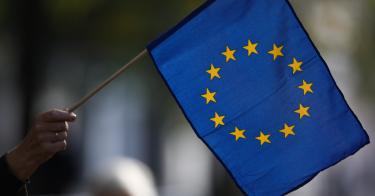When Joe Biden took over the White House, many Europeans cheered, “The adults are back.” Months later, they are asking, “Where did they go?”
Growing concerns about American leadership have triggered renewed calls for an autonomous, pan-European military dedicated and able to serve a European agenda. The prospects for European strategic autonomy are no more realistic. Yet, the persistence of this proposal strains the transatlantic relationship, which has not improved under the Biden presidency despite all expectations.
European leaders were angered that Biden rejected their request to extend the deadline for the U.S. troop withdrawal from Afghanistan and then directed an uncoordinated retreat that put their in-country forces and citizens at risk. Relationships further deteriorated when, in an effort to recover from the criticism of not engaging allies, the U.S. abruptly announced a new security pact (AUKUS) with the United Kingdom and Australia without either consulting or informing Brussels (let alone Paris).
Quicker than a returning boomerang, European leaders were back to arguing, as they had when Trump was around, that America isn’t dependable.
>>> Did Joe Biden Just Give a Green Light to an EU Army?
Shortly after the AUKUS announcement, High Representative of the European Union for Foreign Affairs Josep Borrell declared, “We must survive on our own, as others do….” Borrell has also stated, “It’s clear that the need for more European defense has never been as much as evident as today after the events in Afghanistan.”
In her State of the Union Address, European Commission President Ursula von der Leyen likewise suggested, “The good news is that over the past years, we have started to develop a European defense ecosystem. But what we need is the European Defense Union.” Von der Leyen urged the member states to increase collaboration and embrace European-wide strategic defense priorities.
The boldest claims for “European strategic autonomy,” however, have come from French President Emmanuel Macron. In 2019, he declared NATO “brain dead,” repeatedly showing a preference for supplanting rather than updating the alliance. When the AUKUS agreement to sharing nuclear submarine technology with Australia led Canberra to cancel a multibillion-dollar submarine contract with France, Macron recalled his ambassadors to the United States (for a time)—suggesting perhaps he thought Washington was brain dead, too.
Clearly, some Europeans are reflexively back to calling for collective defense capability without the U.S. But are they any closer to achieving this goal?
In 2007, the EU established a requirement for a European system of battlegroups totaling 1,500 troops. That force, if it exists anywhere beyond paper, has never been deployed. Now there is a proposal to create a “first entry force” of 5,000 troops. A force that size still can provide nothing close to real independent military capability.
Will the EU ever step up? There are more than a few obstacles.
For starters, Europe’s two main security concerns are Russia and the problems of the Middle East spilling over into Europe. Collectively, Europeans don’t have the military capacity to deal with either of those threats.
Even if the Europeans wanted to do other stuff, either in theater (something on the scale of operations in Kosovo and Bosnia in the 1990s) or out of theater (like in the intervention of Libya during the Arab Spring), they couldn’t without support provided by the U.S. What’s so autonomous about that?
Further, the EU does not have a truly common foreign policy: the national interests of the various member states are often in mutual conflict. How can the EU have a common defense policy in the absence of a unitary foreign policy?
And who would manage the deployment of European troops? Involving all 27 member states in the decision-making process is not going to work. Does anyone really think Brussels can run military operations? Of course, Paris would gladly put Paris in charge, but would Berlin and the rest of Europe vote for that?
>>> Biden Wants NATO To Focus on Climate Change. What About Russia?
Finally, everyone in Europe is clearly not on board with this agenda. Eastern European countries fear that a more autonomous defense could weaken NATO and its relationship with Washington, thus indirectly favoring potential Russian aggression. In addition, further deterioration in transatlantic relations threatens to make the Old Continent increasingly vulnerable to Chinese economic and political penetration.
Oddly, though Biden is now out of favor, his administration favors more European autonomy, but for all the wrong reasons. If the Biden team’s game plan is to outsource problems to Europe rather than partner with Europe, and Biden's support for EU strategic autonomy would only help Europe fail faster.
Strategic autonomy might sound empowering, but it remains little more than a distraction and irritant to the transatlantic community and the real issues. European nations need more national defense capacity. Europe needs a strong, innovative, and productive defense industrial base, and Europeans need to take collective security and its role in a Europe whole, free, prosperous and at peace seriously. These problems can be better addressed by building the militaries the Europeans need than the fantasies Brussels wants.
This piece originally appeared in Real Clear Defense




